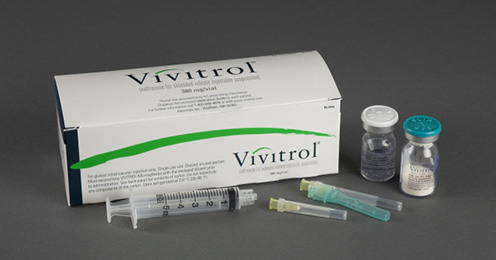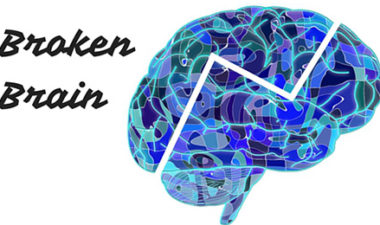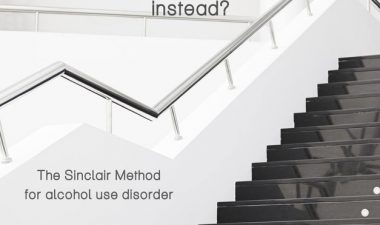Last night, we participated in our first Families of Addicts (FOA) meeting. For those of you who don’t know, FOA is a nonprofit, Dayton organization that helps to bring education and awareness of addiction to families, friends, and addicts alike. They have a number of weekly meetings all over Dayton (one downtown, in Springfield and Troy) where they celebrate milestones, promote education and have guest speakers who promote different kinds of treatment and recovery programs. It was at this meeting that I received a question about Vivitrol.
A Little Background…
A little over 2 weeks ago, the founder of FOA, Lori Erion, reached out to our facility. Somehow she had heard that we previously used the Bridge Device (a neurostimulator that helps assist with the pain and discomfort of withdrawal for 5 days while detoxing in preparation for the Vivitrol injection), and she had the perfect candidate who wanted to give it a shot. Within a matter of 36 hours, this patient had the Bridge Device placed in our office and left for a hiking vacation in Michigan (yes, he went hiking during active withdrawal, and he enjoyed it). A mere 6 days later, we injected him with Vivitrol. Lori was so pleased with this patient’s results that she immediately wanted him to share his success story at their next FOA meeting, and she invited us along to talk about how the Bridge Device works.
Upon completion of our lengthy discussion on the science of the Bridge Device, the guests had lots of questions, but the one that hit me the hardest, the one that I completely was NOT expecting was……. “What is Vivitrol?”
I’m not sure why, but I was very surprised to learn that a lot of the crowd was not familiar with Vivitrol, or they had heard of it, but were not sure of how it works, why it works, etc. Why hadn’t I thought, not even once, that people may need to understand Vivitrol before understanding the Bridge Device? My phone rings constantly from people wanting to know what their treatment options are. At my office, we use Suboxone (or Zubsolv) and Vivitrol. I always make sure that whoever is on the other end knows what each medication is, what it does, how it works and what they need to know, so the simple fact that I hadn’t covered this beforehand, let alone even thought about it, is my inspiration for this piece.
So, What is Vivitrol?
Vivitrol is a medication used to manage opiate (and alcohol) cravings. It is an intramuscular injection that lasts 28 days and is non-addictive; when combined with counseling and other behavioral modification efforts, it’s proven to help prevent relapse. Vivitrol blocks opioid receptors in the brain while the patient works with the psychological aspects of counseling. While on Vivitrol, patients often report that they have no desire to use opiates or to get high. Vivitrol takes the pleasurable thoughts away. Naltrexone, the active medication in Vivitrol, comes in a pill form that can be dosed on a daily (or as needed) basis. Vivitrol injections cost around $1400. HOWEVER, they are 100% covered by ALL Medicaid plans and most commercial insurances with a prior authorization. (But that’s my job to worry about, not yours…. and if you have a high deductible plan or no insurance at all, the company Alkermes provides samples to prescribing doctors.)
How does Vivitrol work?
Vivitrol is an “antagonist”, or blocking medication. Antagonists attach to opioid receptors and create a barrier that blocks opioid molecules from attaching to the receptors. They do not cause the release of dopamine, which causes users to feel good, like other drugs do. So if a patient decides to use, the only thing they will feel is frustration, because the effects of the drug won’t work.
Vivitrol is non-addictive and does not lead to physical dependence; patients will not feel a withdrawal from discontinuing it’s use, either. Vivitrol blocks opioid receptors in the brain for 28 days at a time, helping patients to prevent relapse while they focus on counseling.
How do I start Vivitrol?
Before receiving Vivitrol, patients must go through detoxification from all opiates (yes, Suboxone too). If a patient is injected before they detox, they will experience precipitated withdrawal lasting anywhere from a day to a week, depending upon how premature the injection is and the substances and amounts the patient was using. Unfortunately, most of us know that withdrawal from opiates is what keeps a user using. That makes Vivitrol something that patients write off immediately, mainly because that getting clean is impossible to achieve in their minds.
If a patient is only using heroin, a five day detox is safe enough to do the injection without feeling too much discomfort. For pain pills, it’s 7 days, Suboxone is 7-9 days and methadone can be as long as 2 weeks. During the detox process, comfort medications to ease withdrawal symptoms are provided. These medications work together to make the mandatory withdrawal manageable. By no means is it a walk through the park, but it is definitely achievable.
Once you’ve done your time, we do what’s called the “Naltrexone Challenge” before your Vivitrol injection. The Naltrexone Challenge is where we give a quarter of a naltrexone pill (the active ingredient of Vivitrol, only in pill form) to the patient and monitor their reaction. If within an hour, the patient does not have a reaction (withdrawal symptoms), then they are safe to take the injection. If the patient does have a reaction, they won’t feel too bad for very long since they were only given a small portion of the pill. Then, we try again the following day.
Get Your Shot…Every Month!
Vivitrol, along with all medications used in the assistance of addiction treatment, is proven effective ONLY when the patient actively participates in counseling. Whether it be individual chemical dependency counseling or in a group setting, addressing the reasons why the addiction began in the first place and learning new, positive ways to deal with triggers (or stressful situations) is the key for long term recovery.
Opiate dependence and addiction also sets you up for a broken, malfunctioning brain (It’s not you, it’s the drug; check out our previous blog “Broken Brain Syndrome” and you’ll understand better the destruction your brain endures during addiction). The time spent stabilized on medication is crucial to rebuild the important functions that were destroyed while you were addicted. Alkermes, the manufacturer, recommends a year of treatment, and I agree- at least a year. If a patient stays on Vivitrol their entire life, kudos. At least they didn’t relapse.
The goal of Vivitrol is solely to prevent relapse by reducing cravings. I often compare Vivitrol to a condom. Sometimes I get a laugh, sometimes I don’t, but usually the message is well received: Vivitrol is used for protection. If it’s not there, you are not protected. Too often I have seen Vivitrol work too well. Patients get two or 3 injections deep and think they’re doing great- living their new life, doing their thang, and I’m sure they are, but then they miss their injection. Life continues on, free of the agony of withdrawal because your body does not become dependent on Vivitrol (suddenly stopping Suboxone would guarantee a withdrawal in 36-48 hours by the way, which usually gets patients begging for the next available appointment). A week or two go by without an injection, but still they’re doing well. You can literally bet your life that sooner rather than later, whether it be the stress of a job, fight with your girlfriend or finding an old pill/cap of heroin hidden away somewhere, an opportunity to relapse WILL present itself and the protection you once had from Vivitrol will not be there. Suddenly, you’ve relapsed and heading right back to where you once were.
Please take my word for it: DON’T MISS YOUR SHOT!!! You are NOT okay to go without it after 30 or 60 days clean, and the reason you’re doing so well is BECAUSE Vivitrol is doing it’s job. Let it do its job! Every 28 days. Religiously. Ask your provider for a prescription of naltrexone pills at your first injection because sometimes things do come up and you may have no choice but to reschedule your appointment. You can’t afford not to have that protection.
Call937 416 5442 if you have any questions or want to get scheduled. We are here to help. I don’t care if you’re coming to my facility or not, I want to help you help yourself.



